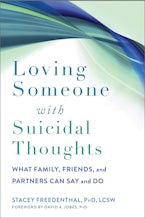By Stacey Freedenthal, PhD, LCSW
People with suicidal thoughts often keep them secret—even from their therapists. Many times, they believe any expression of suicidal thoughts, no matter the intensity, will get them hospitalized. Other times, they may fear you’ll think they’re weak, attention-seeking, or “crazy.”
If you believe your client may be hiding suicidal thoughts, don’t wait for them to volunteer the information. Instead, ask directly if they’re thinking of suicide. For example:
- “Do you have suicidal thoughts?”
- “Are you thinking of ending your life?”
If the client denies suicidal thoughts, learn more. Here are things you can say to dig deeper:
- “Even though you don’t have thoughts of ending your life, I’m wondering if you ever wish you were dead.”
Some people are too embarrassed to admit to suicidal thoughts, often for religious reasons, but they’ll admit to wanting to die. If that’s the case, ask how they envision dying. You might discover they actually have given considerable thought to how they could die “accidentally,” like by stepping in front of a bus or falling from a high bridge.
- “If in the future you ever do have suicidal thoughts, do you think you’d tell me?”
You may be surprised by how many people say no, they wouldn’t tell you. Now you can explore their reluctance and dispel any myths or fears that might be holding them back. Sometimes, this conversation alone enables the client to reveal hidden suicidal thoughts to you that only minutes earlier they’d denied.
- “What do you think stops you from thinking of suicide?”
This question can give you insight into their reasons for living and, by extension, the likelihood that they truly aren’t considering suicide.
Ultimately, even if you do your best to create safety and trust, you can’t force someone to tell you if they have suicidal thoughts. If your suspicions persist, talk with the person about ways to stay safe (e.g., call the 988 hotline) in the event suicidal thoughts do arise in the future. And remember, what you say now may help the person to feel safe to tell you another day.
Stacey Freedenthal, PhD, LCSW, is a psychotherapist and consultant in private practice in Denver, CO, and an associate professor at the University of Denver Graduate School of Social Work. Freedenthal focuses her work on helping people who experience suicidal thoughts or behavior. She authored Helping the Suicidal Person: Tips and Techniques for Professionals, and she created the website, https://www.speakingofsuicide.com/. Her latest book, Loving Someone with Suicidal Thoughts, was published by New Harbinger Publications.



